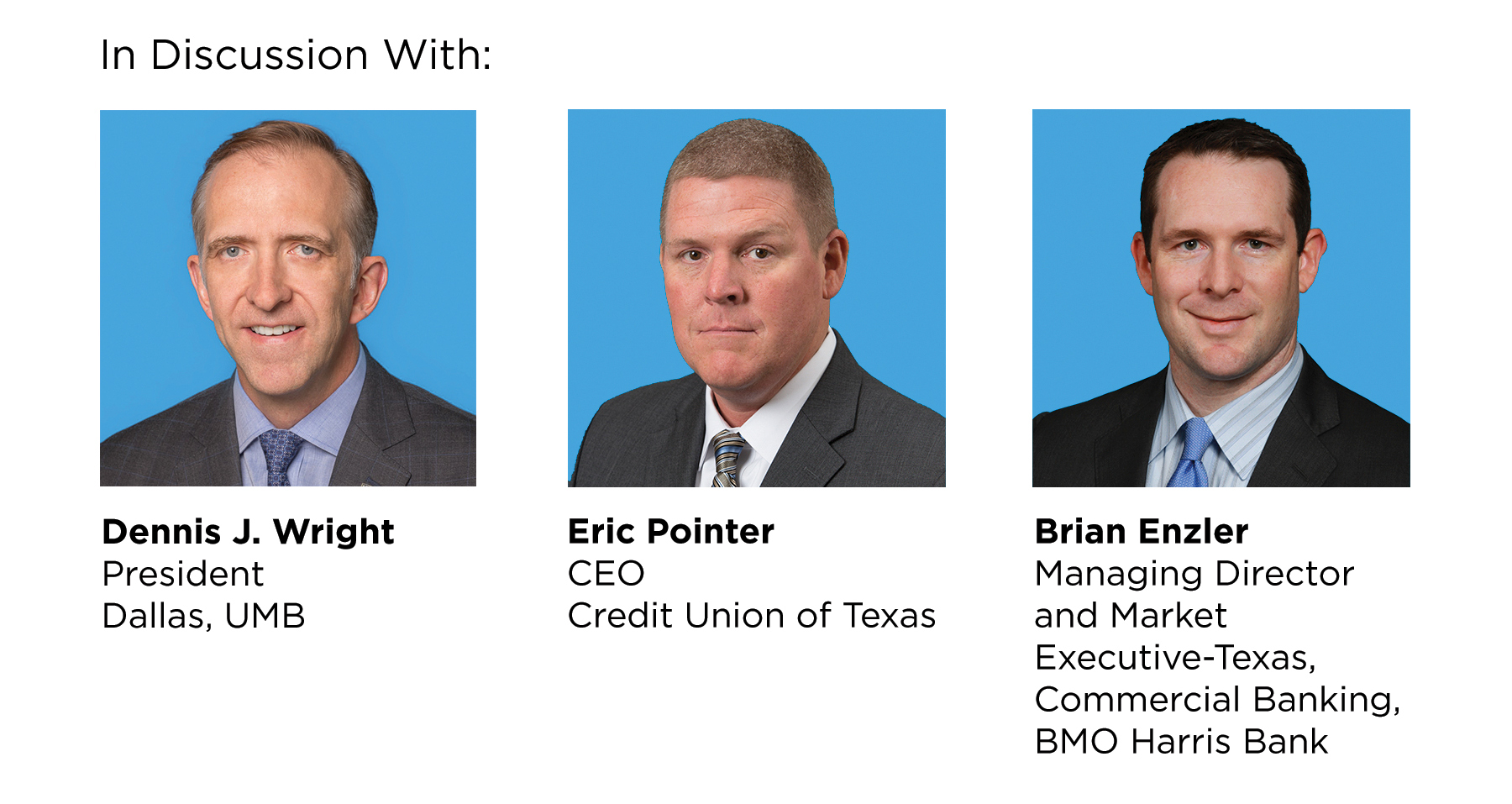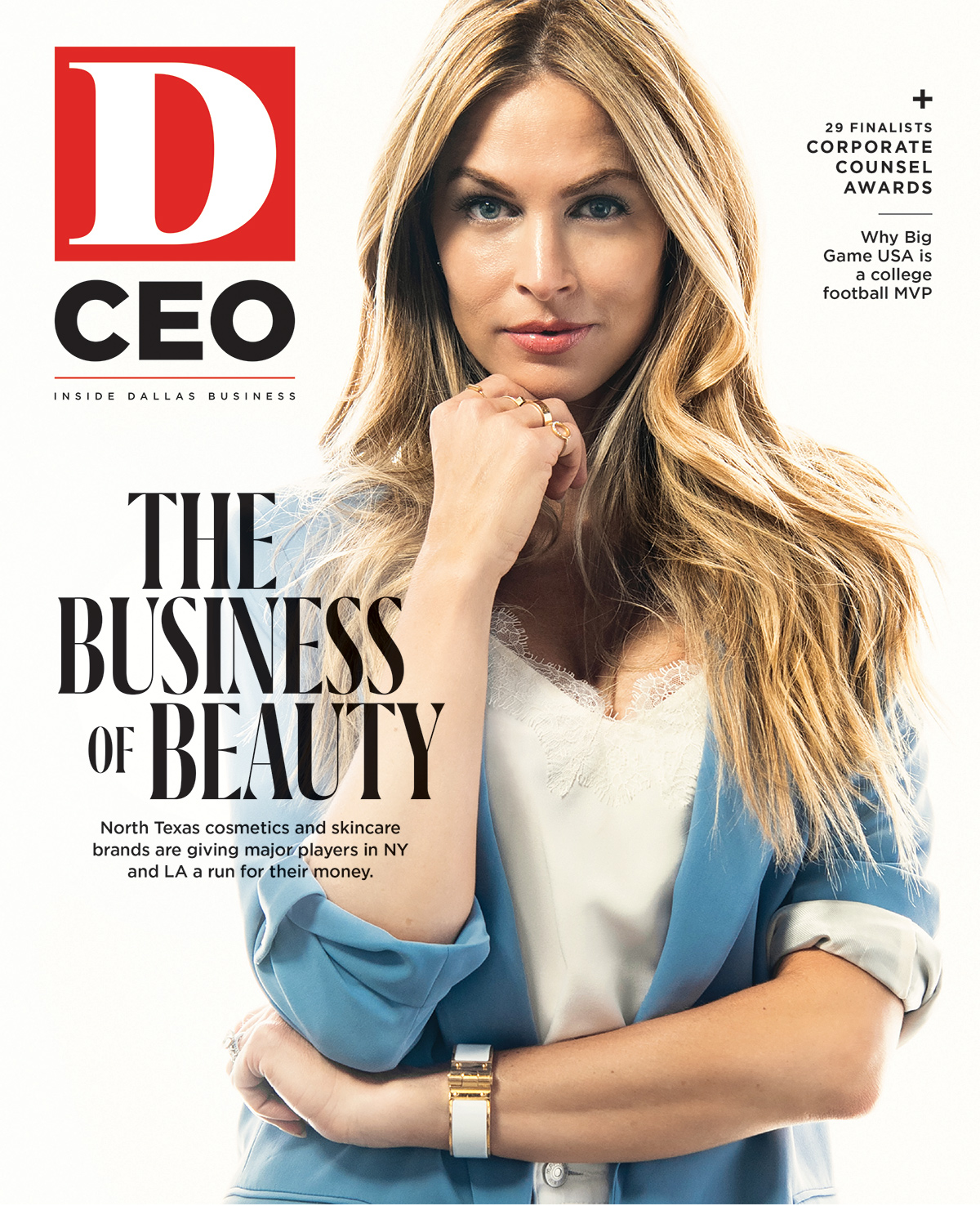Dallas’ most respected banking leaders share their assessments regarding how local businesses are currently handling their banking and finances as well as the various trends they have observed and, in many cases, established.
Other than favorable lending rates, what are businesses looking for in a banking relationship?
Eric Pointer: In today’s world, relationships are often still the most important part of doing business, and companies want to feel that they have a meaningful relationship with their lender. They’re looking for a trusted lender that can educate them about opportunities, be a partner in their growth, and evaluate them holistically. The ability to bring flexibility and creativity to meet the unique needs of our members are also differentiating factors for us.
Dennis Wright: An important question for businesses to ask is, “Do you know your banker?” Now, more than ever, companies need a banking partner that understands their business and how to support them through their life cycle. After the events and impact of 2020, it’s clear that businesses need a partner with a grasp on the nuances of their company and one that can offer customized solutions to navigate them through good, or challenging, times.
Brian Enzler: Businesses are seeking responsiveness, flexibility, creativity, sound advice, stable relationships, and a financial partner that will stand with the company when challenges arise. They’re also looking for proactive solutions to drive efficiency and consistent support for growth initiatives.
How does a bank in 2021 differentiate itself from the competition? Has the economic climate as we emerge from the COVID-19 pandemic shifted that?
Eric Pointer: At Credit Union of Texas, we believe community engagement, listening to the needs of our members, and a willingness adapt to their evolving needs are what differentiates us. Where banks pay shareholders, we invest in our members and our communities. CUTX connects people to local resources in the areas of suburban homelessness, domestic violence, food insecurity, intellectual and developmental needs, and children’s advocacy. We started as a teacher’s credit union more than 90 years ago. Our continued partnerships with ISDs have helped us make an impact in the important area of financial literacy. Our members are best served by our continued focus on education, use of a broader lens when making credit decisions, and by using data analytics to anticipate their needs.
“If you’re doing business in Dallas-Fort Worth, you’ve got opportunities galore.”
Brian Enzler, BMO Harris Bank
Brian Enzler: Our clients value proactive and consistent communication more than ever. With the uncertainty and volatility of the pandemic environment-—supply chains, labor, government programs, health concerns, equity markets, etc.—our perspectives on what we see working for others and how we can support the business’ capital needs has never been more welcome.
Dennis Wright: This is clearly a time where relationships matter. Without relationships, there is no way to differentiate because you will lack the strong partnership required to offer the right solutions for your clients. Relationships are essential to the way we do business, and we leaned into that even more during the pandemic to ensure clients and customers felt that partnership as they navigated unchartered territory. Our model is built for all economic environments and that has proven out again this past year. We continue to lend and support the economy while remaining nimble, flexible, and responsive to our customers.
What are the pros and cons of charitable giving for businesses today?
Brian Enzler: Charitable giving and community involvement are, in my view, always important for business. They provide a way to give back, help others, and engage with the community directly in a tangible way. These activities can also help build culture as team members contribute and participate together. That said, management teams must consider how to prioritize resources to maximize impact and ensure the continued success of the business. When done right, a virtuous cycle is created.
Eric Pointer: At Credit Union of Texas, we firmly believe that giving back to the communities you serve is one of the most important things a business can do. Charitable giving not only offers obvious financial benefit to a community but it often also provides a community with much-needed, hands-on volunteer support. In addition, we find that financial and volunteer service to our communities is one of the best ways to connect with our communities and members. In fact, we have a dedicated team of community engagement specialists who focus solely on partnering with their designated communities and addressing each community’s specific needs through both financial support and team member volunteer hours. We promote a volunteer program to all our employees. With each hour that our employees volunteer, they receive an hour of PTO. Our volunteer program allowed our employees to serve over 500 volunteer hours last year alone.
How is the current tax landscape affecting your business clients in terms of their banking strategies?
Brian Enzler: Many business owners are expecting increases in capital gains tax rates and are therefore implementing strategies to potentially accelerate execution of their estate planning or to otherwise mitigate the impact of higher taxes. We collaborate closely with our private wealth and corporate advisory teams to provide custom solutions in support of those efforts.
In today’s economic environment, which industries and markets show opportunity?
Eric Pointer: Credit Union of Texas is currently expanding our focus to include rural and underbanked areas in East Texas. With consolidation in the industry, we believe we can provide enormous value to personal and commercial members there. Our community engagement model will also provide a powerful impact to the public and organizations we’re able to partner with.
Brian Enzler: It’s good to be in Texas, especially North Texas! If you’re doing business in Dallas-Fort Worth, you’ve got opportunities galore.
Are there tools or technologies that your bank has implemented that are changing the way you serve clients or the information and insights you’re able to provide? What excites you about the role of technology in banking?
“Local businesses tend to be expanding and investing more this year due to favorable interest rates, M&A interest, and continued business and residential relocation to the area.”
Dennis J. Wright, UMB
Eric Pointer: In looking to create an easier member experience, we have identified several digital solutions that push pre-screened offers and other data to members, rather than relying on them to pull it themselves or submit a standard application. This better serves our members by removing the anxiety associated with the typical approval process and provides them with the real-time data and potential cost-savings details needed to make sound financial decisions. We implemented a business-to-member texting platform that sends reminders and other communications and allows for the ability to make payments via text. We have also implemented appointment-setting software that allows us to provide a safe environment for our members during the peak times of the pandemic.
Dennis Wright: What has always set us apart is that we will tailor our technologies and solutions to clients’ particular needs. We integrate our technology to build efficiencies for a broad range of clients—not just a select few.
Based on what you’ve seen with your clients, how does the current state of our economy affect business banking strategies?
Brian Enzler: Communication, communication, communication. More than at any time I can remember, management teams want to hear more from their bankers more often. The perspectives we can bring—whether on new technology, industry expertise, general observations about how businesses are solving challenges, or solutions to maximize shareholder returns—have always been valuable, but perhaps never more so than in today’s incredibly dynamic marketplace.
Dennis Wright: There are a few ways the current economy is impacting the industry. First, being able to find labor and talent at a desirable cost is a very real concern. Companies are hiring again, but a challenge in our economic recovery and the success of small businesses will be access to talent. Additionally, amid questions surrounding a potentially large shift in tax policy with the new administration, business owners are reviewing their options. Those who were already considering selling their business in coming years could take action this year to avoid unfavorable tax policy changes.
What financial services products and programs have emerged as popular among your business clients in the last few years?
Brian Enzler: Technology-based solutions continue to see high demand for optimizing liquidity, increasing efficiency, and reducing risk. We’re helping clients continue to move away from paper and manual processes toward electronic payments and workflows. We’re fully automating payments, providing custom accounts to maximize yield on cash, and bringing heightened awareness to fraud risk and prevention measures.
Dennis Wright: We continue to experience growing demand in integrated payables. The need to streamline payments and reduce costs became even greater last year, and seamless, secure, and efficient payments are being increasingly accepted as a critical part of successful business operations. Overall, UMB has been continually investing in our technology. We have built out our innovative digital banking offerings, like our business online banking platform. We have always been nimble and responsive to client needs, and now that businesses have become more flexible in their operations, we are making sure our solutions continue to enhance their banking experience.
During the peak of the pandemic, methods of providing service to clients were modified by most, if not all, industries. Are you finding that some of the new methods you deployed will remain in place as pandemic conditions ease?
Dennis Wright: During the peak of the pandemic, as a relationship-centric bank, we really missed the ability to sit face-to-face with many of our clients and customers and have in-person interactions. While those encounters are important to our business and we’re glad to be able to safely conduct them again, the growth of our digital offerings and digital communications over the past year have made us more flexible than before, and we will continue to take full advantage of our enhanced technology to benefit our clients.
Population growth in Dallas and surrounding areas has been robust. Are your business clients experiencing positive effects?
Dennis Wright: Dallas has become a prime relocation destination for people and businesses across the country. We’re seeing the benefits, especially for local suppliers who are experiencing a positive impact from increased demand. Over the long-term, the favorable tax environment and business climate in the state could lead to more migration and strengthen numerous industries in the region.
How have the events of the past year changed investment behavior and investor decision making?
Brian Enzler: Companies are investing in technology that automates processes and allows teams to be more efficient, whether in-person or at the site of business. Investment in automation is not just for businesses that manage physical products anymore. We’re seeing investment in technology that streamlines processes in all sectors.
What are some of your clients’ biggest financial concerns currently, and how are you addressing them?
Dennis Wright: Many of our clients have done well this past year and feel optimistic as the economy fully reopens. There remains some general caution on investments and supply chain issues for certain industries, but one of the current concerns for clients with cash on their balance sheet is what course of action they should take—and when—with a potential shift in tax policy. We’re working with clients to find the best financing solutions for their unique situations.
Despite a stronger economy and higher inflation (at time of publication), the Fed has indicated that interest rate hikes are unlikely through 2023. They have taken the view that the current increase is the CPI is transitory as it is largely due in part to the supply chain backlog. Do you agree with their assessment?
Brian Enzler: Many of our customers are experiencing not only supply chain cost increases and delays, but wage pressures from an exceptionally tight labor market (that tend not to be temporary). Supply chain challenges appear to have moderated in some areas but not others, and I expect challenges to continue for some time. With the combination of these two factors, I expect the Fed to raise rates sooner than forecast.
Any trends you are seeing in what Dallas-Fort Worth-based business borrowers are doing with the financing you provide?
“In today’s world, relationships are often still the most important part of doing business, and companies want to feel that they have a meaningful relationship with their lender.”
Eric Pointer, Credit Union of Texas
Dennis Wright: Local businesses tend to be expanding and investing more this year due to favorable interest rates, M&A interest, and continued business and residential relocation to the area. Last year, businesses were far more cautious due to economic uncertainty. Now we’re seeing more capital expenditures—with companies taking on debt to do that. This is an ideal time to make that move if you’re committing to a long-term asset; business migration to the region and the overall economic climate are driving a lot of capital expenditure investments based on expected growth.
Brian Enzler: After coming through the pandemic environment with strong balance sheets and lean operations, many borrowers are utilizing debt capital to grow their business through acquisitions or capital expenditures. We’re also seeing an uptick in financed dividends/distributions as estate and tax planning mechanisms.
What is the top question every CFO should ask their current banker?
Dennis Wright: We’ve heard from local businesses that, in the wake of the pandemic, they learned their bank might not share the same optimism and outlook for their industry. CFOs need to ask their banker, “What is your view on my company’s industry?” and make sure they have the right banking partner in their corner.
Brian Enzler: “What are three ways you can help me grow my business?”
Author







